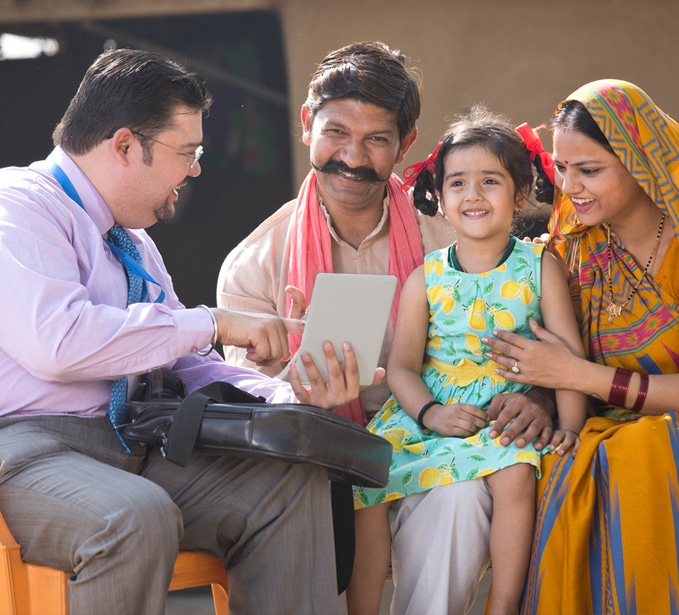
India witnessed a shift in the microlending landscape in the last decade. Approx. 60 million women across the nation have a massive outstanding loan portfolio of INR 2,59,377 crore in March 2021, says a report (Micrometer by MFIN) .
To meet the evolving consumer demands, the industry has transformed their entire lending process which includes a faster, secured, scalable and streamlined borrowing experience to the end customers. Increase in mobile penetration across rural markets has paved the path for digital emergence. The major factors which have led to a spur in growth are – increased digital connectivity and innovation.
Tech driven solutions are disrupting microfinance lending from loan origination to disbursement. Digitized loan origination automates and manages every step of the lending cycle such as loan application, documentation, verification, credit bureau check etc. It speeds up processing and approval of loans faster. It further streamlines lending operations and minimizes the credit risk with business rules & CB report.
Tech driven solutions are disrupting microfinance lending from loan origination to disbursement. Digitized loan origination automates and manages every step of the lending cycle such as loan application, documentation, verification, credit bureau check etc. It speeds up processing and approval of loans faster. It further streamlines lending operations and minimizes the credit risk with business rules & CB report.
Amidst the thrive of microfinance institutions, Group Loan Origination used to be a cumbersome and document intensive process by which a borrower applies for the loan. Nowadays, with the increased use of automation & digitization this process is becoming easy and quick.
Let’s understand the whole process of loan origination in a brief manner.
Loan Origination Process

Village Survey
It is conducted to extract the basic information of the village like population structure, business activity, financial dependencies, social dynamics, law, and order scenario etc. It is used to assess the viability of the residents of the village from a bird’s eye view to begin with the credit operations.
Lead Generation
It refers to the action of identifying the potential clients through village surveys and briefing them about the company and its products. It helps to stimulate the interest of the borrowers and increase their awareness about the loan product.
Pre-Qualification
It helps to check the eligibility and authenticity of the borrower for a particular loan product. Borrowers must provide ID and other documents to establish their eligibility. Following documents are demanded by the lenders
- Voter Id or Aadhar card
- Address Proof
- Bank Account details
- Consent for e-KYC with biometrics or OTP
These documents are verified by the lender and the credit score of the borrower is also checked. Once the screening out of ineligible candidates is done the borrowers are allowed to proceed with the loan application.
Loan Application
Borrower provides all the relevant information in a detailed manner to the officer. The application is intensive and requires all the information like financial history, monthly income and expenses, bank account, insurance, loan purpose etc.
Loan Underwriting
It is a due diligence process where the lender does deep scrutiny of the applications and the Credit Bureau report can be reviewed, if required, to check the authenticity of the details provided by the borrower. Applications are sent back for correction if any error is found at this stage.
Customer Onboarding
Finally, the customer receives the decision on approval of their loan application and a loan card is provided to them. Within 7 days of onboarding the disbursement is done in the customer’s bank account.
Traditionally, loan origination was an intensive, time-consuming and complicated process as it involved manual underwriting and paperwork which is where digitization offers the chance to deliver rapid and responsive services to the borrowers in a manner that has never been done earlier.
Benefits of Digitization

Reduced TAT (Turnaround time)
It promoted speed and efficiency as the verification process can be done digitally through eKYC, Video KYC, eSign, etc. therefore, reducing the turnaround time by almost 50 %.
Increased Scalability
Robust technology helps to scale up the business operations in a swift manner. It takes less time for the whole process, so more customers can be onboarded as data and ID images are available across the organization to scrutinize it
Lower Cost
Digital software streamline the operations and result in more accuracy thereby reducing the cost per transaction. Features like integration with credit bureaus and other third parties, automated reporting to the branch helps in making the right decision that saves on cost.
Enhanced Accountability
Digital sourcing, data driven processes and the correct use of tech-enabled services have helped to reduce human intervention making the processes more accountable and accurate. It becomes easier to mold the process according to the dynamic regulatory environment.
Analytics helps financial firms to yield instant, automating the KPIs (Key Performance Indicators) of the business operations. It offers flexible features like highly customizable applications, and extensive third-party integrations. Moreover, predictive analytics are transforming the industry while inducing decisive promptness.
Road Ahead

Educating Customers
Low digital and financial literacy of the customers poses a challenge for the MFIs, it requires customer education and spreading awareness to build trust and establish reliability.
Digital Adoption
MFIs handle employees and business correspondent partners with limited formal education and financial training of the field staff. This limited understanding of the banking infrastructure and digital services available leads to limited adoption in the ecosystem.
Advanced Data Security
Ensuring a secure and encrypted database for storing personal data is essential. Data protection and cybersecurity is of utmost concern for a successful digital adoption while ensuring business continuity.
Self-Onboarding
Having acknowledged the requirements of today’s customers, MFIs are transforming their processes to offer an experience that is comfortable and easily accessible. The whole process of onboarding is completely digitized, and customers do not require to go to an office or branch. Documentation is done through APIs and video KYC helps in real-time customer verification. It is possible with the advent of the digital onboarding to apply for a loan remotely with the same security and trust.
Digital loan origination will ensure streamlining of operations and ease of entering data quickly for the field officers. It will be cost effective and add value across the chain to make a considerable impact.
MFIs success depends on their ability and agility to adapt to the digital services for loan origination and management. MFIs are embracing digital transformation by harnessing the potential of their business network and partnering with fintechs to deliver personalized, digitally enabled services.
About Craft Silicon
Craft Silicon is a leading financial technology solution provider and recognized as one of the most tech-savvy software groups globally. Craft Silicon supports 300+ financial Institutions by delivering value in over 30 countries. Craft Silicon provides robust solutions that include Core Banking, Loan Management, Channel Banking etc. – Managing over $5.6Bn of Loan Portfolio, 57Mn customers & 1Bn transactions per year in Asia region.
GLOW – Group Loan Origination Workflow is a customized software with capability to capture the entire loan portfolio data in one place from the initial village survey, loan origination and to the final disbursal stage. It has Comprehensive loan tracking mechanism from origination to disbursement
- Digital KYC
- Centralized data management
- Real-time access with authorization controls
Trucell – Field Operations made easy – A mobile application specifically designed to support and empower Microfinance field operations. Key modules include Loan Collection, Loan Disbursement, Loan Utilization, Fees Collection and Repeat Loan Processing. Trucell hosts a range of functions and activities to make work easier, quicker, and efficient for field officers.
Author: Divya Jyothi | Assistant Marketing Manager
Divya is a goal driven Marketing and Product design professional with over 6 years of corporate experience. She oversees end-to-end marketing management by developing and executing integrated marketing strategies to advance sales and customer engagement. Functioned as a Meticulous product designer balancing multiple deadlines while maintaining an organized yet, creative approach towards user research, product interaction design, UX & UI design.
One Response
Very Insightful